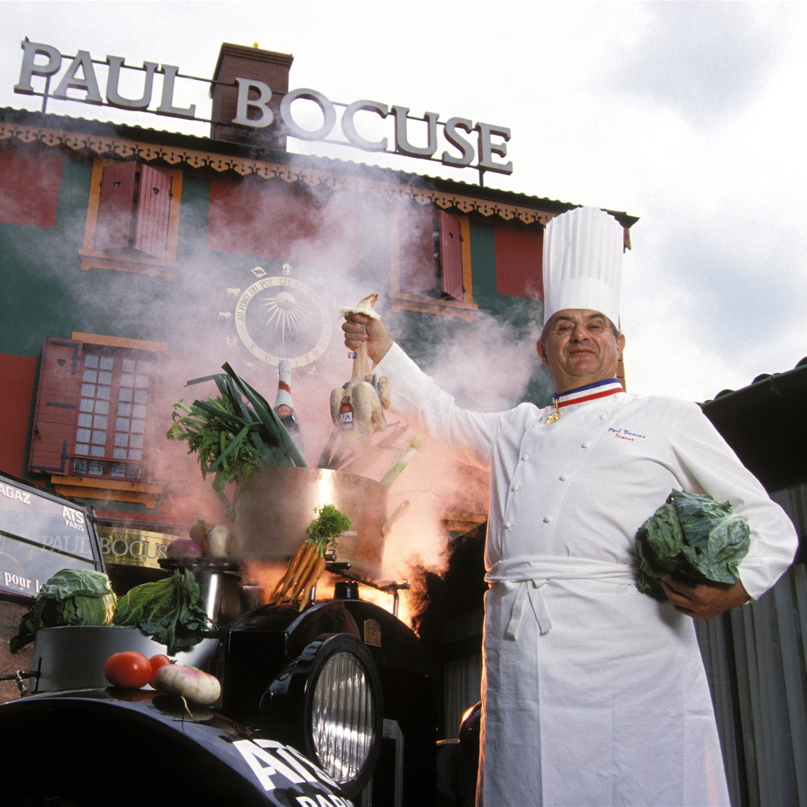The French follow chefs with a level of obsession that, in other countries, is reserved for football and movie stars. As restaurants roar back into action after the summer holidays, the most talked-about men in the business both happen to be dead.
Michel Guérard, the beloved chef who held three Michelin stars for 47 years at his restaurant and spa resort in Eugénie-les-Bains, in southwestern France, died on August 19 at 91 years old. As the inventor of la cuisine minceur, a style of cooking that re-interprets classic French dishes using lighter ingredients, Guérard received obituaries that were glowing. Almost always, they mention his devotion to his late wife, Christine.
Now, with the September 18 publication of a dishy new memoir, attention is turning to Guérard’s close friend the late Paul Bocuse.
He died six years ago, also at the age of 91, and was equally celebrated as one of the greatest French chefs of all time. But unlike Guérard, he was a notorious womanizer. Together, Guérard and Bocuse were the salt and pepper of Gallic gastronomy for more than 50 years.

Bocuse Malgré Moi (Bocuse, Despite Me), by food writer and editor Eve-Marie Zizza-Lalu, is especially intriguing because the author is the only child of the married Bocuse’s second mistress. In 1975, when Zizza-Lalu was seven years old, Bocuse got together with her mother, Patricia Zizza. Before long, Zizza-Lalu writes, he was the “enemy of my childhood” who “never had dinner at our table but devoured our life.”
Her mother went to work for Bocuse and became, in Zizza-Lalu’s words, his “attaché de presse, mistress, goddess, whore, chambermaid, domestic, scheduler, and shoe polisher.”
At the beginning of their liaison, Bocuse asked her to keep the matter private, given his other entanglements. This led to all sorts of suffering. His voracious personal and professional needs meant that the young Zizza-Lalu was deprived of her mother for weeks, sometimes months, at a time, left in the care of a family that was paid to board her.
Still, Zizza-Lalu’s relationship with Bocuse helped launch her career. The chef asked her to write his official biography, an illustrated hagiography called Le Feu Sacré (The Sacred Fire), which was published in 2005. Her ambivalence was obvious even then. She wrote that he “wasn’t exactly a god, and he certainly wasn’t a saint either.”
Now she’s moved on to a j’accuse-style polemic. It is poised to ignite another round of conversation about the sexism and sexual abuse that have long been key ingredients in French gastronomy. As Bocuse once confided to me, “If you haven’t fucked well, you can’t taste well, and then everything is lost.”
He was completely obsessed with sex. I learned this when I traveled to Lyon to profile him for an English newspaper in 1988, when Bocuse was 62. We had planned to meet at nine a.m. at the stall of La Mère Richard, a cheesemonger in the city’s main food market. (Today, it’s known as Les Halles de Lyon Paul Bocuse.)
Bocuse “wasn’t exactly a god, and he certainly wasn’t a saint either.”
Due to a transit strike, I jogged nearly five miles to the meeting, and when I arrived, my shirt was soaked. Madame Richard eyed me with contempt and disdainfully said, “You don’t make the world’s most famous chef wait for you. He’s eating some oysters at the end of the next aisle.”
And so he was. As I apologized for my tardiness, the tall, rangy man with coal-black eyes stopped slurping his bivalves and grinned.
“So what really happened is that you stayed up too late and drank too much and fucked a lot?” he asked, raising his eyebrows. God knows where I found my repartee: “Well, yes, all of that, and then there was a strike.”
He bellowed with laughter and clapped me on the back. “I hope the fucking was good, because you’re young and good-looking, so now is the best time in your life for it,” he said. My cheeks blazed—he was a complete stranger, and my father’s age. And I’d already lost control of the interview.
“We’re going to have a good time today,” he said. An hour later, we were sharing another dozen oysters and a bottle of Muscadet. Then he walked me through the market, explaining his deep love of Lyon. “It’s simple—there’s nowhere else with such good produce,” he said. “We have the world’s best chicken, le poulet de Bresse; beef from the Aubrac; pork from les Cévennes; walnuts from Grenoble; amazing fruit all year long; and some of the world’s best cheeses. You won’t eat better anywhere else.”
Everywhere we went, the vendors—primarily women—stopped us to offer their wares. As we prepared to leave, a beautiful fishmonger with black hair and blue eyes gave Bocuse a coy greeting: “I thought you’d forgotten about me.” Then she served us a slice of seafood terrine made from scallops and sea urchins.
I declared it one of the best things I’d ever eaten. “Of course it is—the best food always tastes like sex,” said Bocuse without lowering his voice. The fishmonger giggled.
A few hours later, we were sitting on the embankment of the Saône River eating raspberries from a blond wooden box. I tried to change the subject, but Bocuse couldn’t stop talking about my homosexuality.
“It’s not that I disapprove, but have you ever made love to a woman?” he asked. I explained that I’d had girlfriends at college, but ultimately my attraction to men was stronger.
“But you could have had both a wife and a boyfriend,” he replied incredulously. “You know, you’re really stupid! If you don’t take what you want in life, you’re a fool.”
That evening, at his restaurant, the meal was spectacular, from the black-truffle soup he’d created for French president Valéry Giscard d’Estaing to the alabaster flesh of the famed Bresse chicken. I ate alone and loved the spectacle, especially the grand finale, when Bocuse emerged from the kitchen and went from table to table greeting guests. Watching him, I understood for the first time how women can easily fall for men who really, really love them back.
“I regret nothing, except perhaps the pain I gave to the women in my life,” said Bocuse in Le Feu Sacré. “I hope they will forgive me.”
Alexander Lobrano is a Writer at Large at AIR MAIL. His latest book is the gastronomic coming-of-age story My Place at the Table: A Recipe for a Delicious Life in Paris


